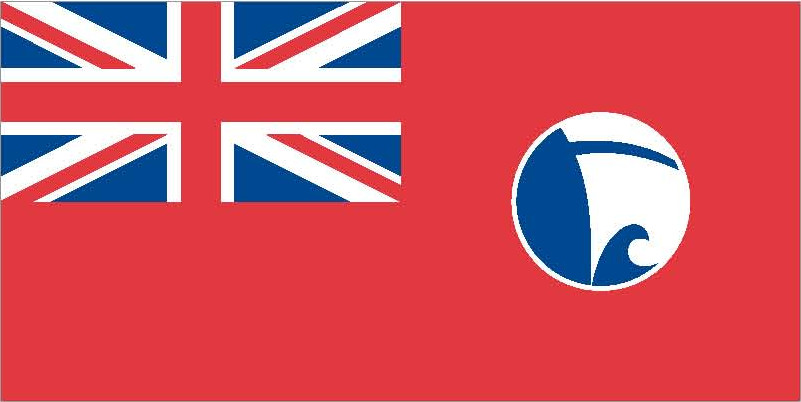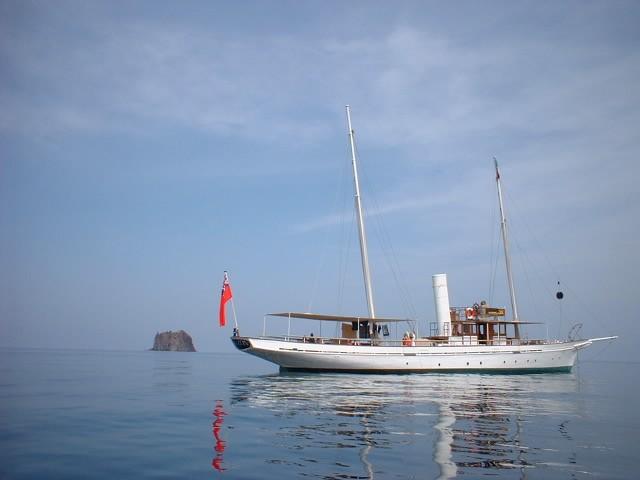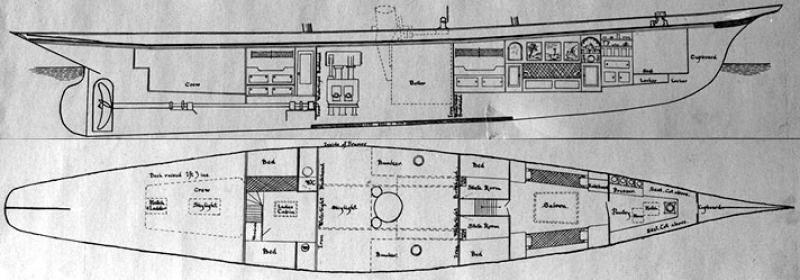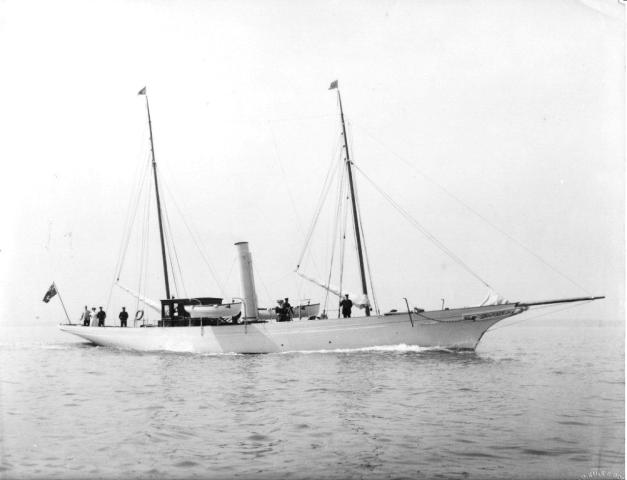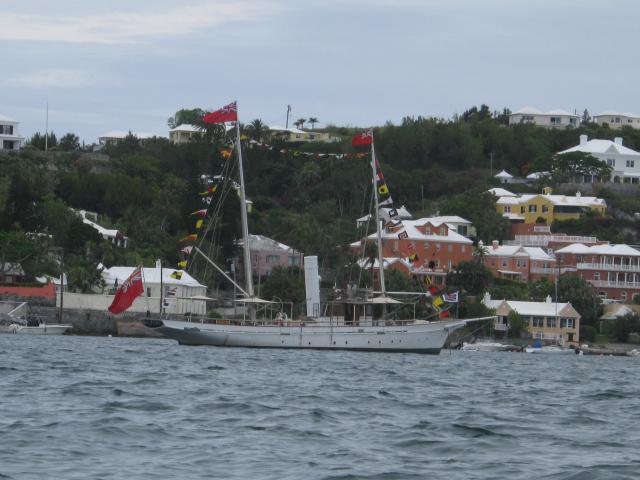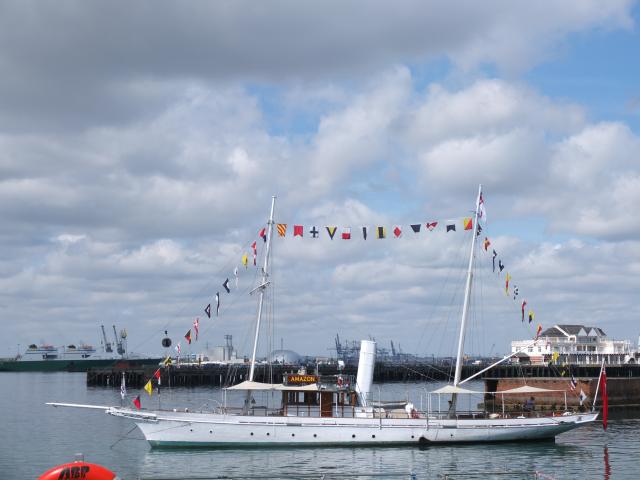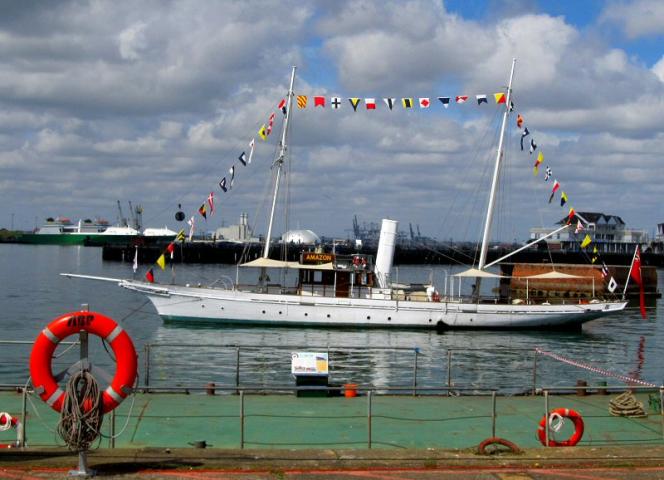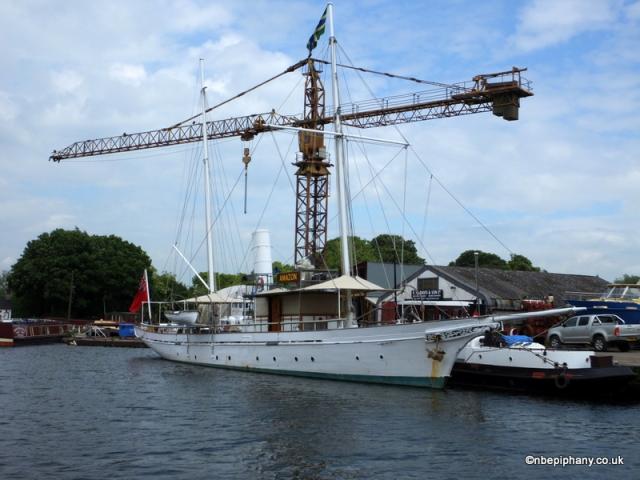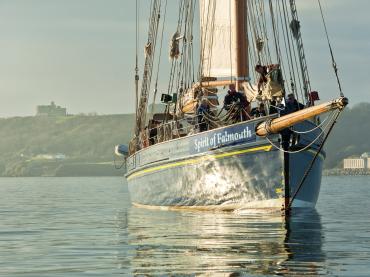Previous names
- 1885 - 1897 Amazon
- 1897 - 1900 Armoricain
Details
Construction
Dimensions
History
AMAZON's provenance is highly significant in explaining her survival today as possible the last remaining, ocean-going Victorian wooden screw schooner, particularly as her hull is still largely original. She has not had a 'restoration'.
She was designed by Dixon Kemp as a screw schooner (a propeller-driven power yacht with sails). Although of a size to undertake ocean voyages, she was intended for use only in the English Channel, where there was no shortage of coaling ports and so she did not require extended endurance at sea. Dixon Kemp notes: "As she was not required to carry a large quantity of coal for long passages, advantage of this was taken to keep the displacement as small as possible, and the lines, both fore and aft, as fine as seemed desirable. The machinery was placed amidships, and this admitted of a better run than can often be had: the afterbody, in fact, being almost identical with the forebody." AMAZON was built by Tankerville Chamberlayne, at his own private yacht yard, which had been created in the 1840s by his father (Thomas Chamberlayne, who died in 1876) to maintain the family's racing cutter, the famous ARROW. Tankerville Chamberlayne shared his father's love of yachting and continued to race in ARROW after 1876. He maintained her in racing trim with some success; in 1882, for example, she won 11 prizes from 16 starts, despite being some 61 years old.
AMAZON represents the pinnacle of Tankerville Charmberlayne's private yacht building success; he personally superintended her build, evidently took considerable pride in her and no expense or trouble was spared to make her as good as she could possibly be as his own family's yacht. While AMAZON would be available to accompany ARROW to sailing regattas if required, she would also allow independent family cruising in comfort under power and did so. AMAZON's sea trials were detailed in Dixon Kemp's 'Yacht Architecture', first published in 1885, where he recorded that the speed trials were achieved with a max 125hp. She was fitted with owners accommodation for two gentlemen (in individual staterooms) together with a twin 'ladies' cabin for two. AMAZON remained in Tankerville Chamberlayne's ownership until 1897, having been used in British and French waters. That year she was present at Queen Victoria's Diamond Jubilee Royal Fleet Review. She was then sold to M. Henri Dubois, Commodore of the Yacht Club Dinard, registered in France and renamed ARMORICAIN.
She returned to the British flag in 1900, where she has remained since. AMAZON was too old-fashioned and would have presented too much of a logistical challenge (with her relatively small coal bunkers) for naval service in the First World War. AMAZON had the very good fortune (and sufficiently wealthy owners) to survive the general cull of steam yachts that accompanied the rise of the motor yacht, the shortage of manpower after the First World War and the effects of the Great Depression. She was certainly remarkable for remaining in steam and active with her original boiler and engine until 1937, when she was some 52 years old. By 1938 she had been refitted with a new oil engine and was moored in Chelsea Reach, London. The Second World War saw AMAZON sacrifice her bronze propeller and 6 inch diameter bronze propeller shaft to the war effort and she became a dumb houseboat at Chiswick. She was very lucky to receive only slight damage from the German V-1 rocket that fell on Cubitt's Yacht Basin and destroyed the motor yacht HALCYON. She remained static at Chiswick until 1968, when she was sold as a houseboat to the actor Arthur Lowe and his wife. Her copper sheathing had preserved the bottom from damage, although the edge of her rudder, where the copper had worn, had been nibbled by gribble.
She was some 83 years old in 1968, but the surveyor's positive report that she was 'in remarkable condition for her age' stimulated Arthur Lowe's heartfelt desire to make her a seagoing yacht again. This was a considerable objective and was achieved in 1971. She was then used as a convenient base and accommodation while Arthur Lowe acted at theatres along the English south coast. AMAZON also undertook some television work and even made an appearance in the Onedin Line in 1979, appropriately playing the part of a steam yacht called AMAZON. Following Arthur Lowe's death in 1982, the yacht was operated for some years by Stephen, his son, as a charter vessel.
By the 1990s however, she was laying in the north of Scotland and had been on sale for several years. It was clear to her new owners that she would need some repair to her counter stern, together with very comprehensive replacement of equipment, systems and tanks. AMAZON was therefore prepared and equipped for sea and made a successful passage in the spring of 1997 from Buckie Shipyard, where she had been inspected, through the Caledonian Canal and from Fort William via Falmouth, and Gibraltar to Malta.
Based at Malta since 1997, AMAZON has undergone necessary repairs, systems overhaul and comprehensive equipment replacement. In 1999 her bottom was stripped and cleaned off, re-caulked and re-coppered. A continuous heavy duty marine diesel engine was fitted. Departing Malta in early 2009, AMAZON undertook a trans-Atlantic passage via Gibralta, the Canary Islands, the Cape Verde Islands and Barbados, continue to St Vincent and the Grenadines, Antigua and Barbuda, Bermuda and the USA; she was 124 years old. In 2011, she made her return trans-Atlantic passage from the USA and via Halifax, Nova Scotia and St John's, Newfoundland, to Ireland.
AMAZON has the distinctly unique privilege of having been present for both the 1897 and the 2012 Diamond Jubilee maritime festivities.
This vessel is a survivor from the First World War. You can read more about her wartime history by visiting our First World War: Britain's Surviving Vessels website www.ww1britainssurvivingvessels.org.uk.
<
Significance
1. What is the vessel’s ability to demonstrate history in her physical fabric?
Evidence for designs, functions, techniques, processes, styles, customs and habits or uses and associations in relation to events and people. How early, intact or rare these features are may impact on significance.
AMAZON's is one of the last remaining, ocean-going Victorian wooden screw schooners. Her hull, of carvel timber construction with wrought iron, bronze bolted strap floors, is still largely original, with only minor reconstruction work carried out. She is built of pine on oak frames, and she has an elm keel and teak planking. She is copper sheathed, with the sheathing having been replaced in 1999. She has two masts and is schooner-rigged with timber spars. Her masts and funnel are lowerable. A number of deckhouses were added and then removed during the twentieth century. AMAZON has not been subject to any major conservation work, although repairs have been made to the counter stern. Her original boiler and steam engine were removed in 1937, when a diesel engine was installed; this engine had been removed by 1960. In 1970 a Perkins S6 100 bhp diesel engine was installed, which was replaced in 1977 with a Ford 6 cylinder 120 bhp unit. In 1999 the current Kelvin R6 120 bhp continuous heavy duty marine diesel engine was fitted.
2. What are the vessel’s associational links for which there is no physical evidence?
Associations with people or places. Off-ship research.
AMAZON was designed by renowned designer Dixon Kemp who makes reference to her in his published works 'Yacht Architecture' which includes details of her sea trials and also in 'Manual of Yacht and Boat Sailing'. She is believed to be one of only two of Dixon Kemp’s seagoing designs remaining and the sole surviving power vessel of his design. She was built by Tankerville Chamberlayne Esq, a member of a major local land-owning family and MP for Southampton, in his private yard in Southampton. She reflects the Victorian class system, with many of the men who built her being tenants on Chamberlayne land. AMAZON was a regular attendee at South Coast regattas and was used as Committee boat by the Royal Southampton Yacht Club. She is believed to have attended the Royal Fleet Review in 1897 held to mark Queen Victoria’s Diamond Jubilee. AMAZON may have been one of many thousands of yachts requisitioned for war service by the Admiralty at the start of the First World War. She became known in the French yachting press when owned by M. Henri Dubois, Commodore of the Dinard Yacht Club. She was later owned by Dad’s Army actor Arthur Lowe, from 1968 until his death in 1982. AMAZON has the unique privilege of having been present not only at the 1897 Fleet Review but also the 2012 Jubilee maritime festivities marking the Diamond Jubilee of Queen Elizabeth II. In recent years, she has cruised extensively, spending time in US waters where she became an exhibit at Mystic Seaport Museum.
3. How does the vessel’s shape or form combine and contribute to her function?
Overall aesthetic impact of the vessel, her lines, material she was built from and her setting. Does she remain in her working environment?
AMAZON is an elegant and aesthetically pleasing vessel, with a clipper bow and a counter stern. She is a distinctive vessel with her slanting funnel and gentle sheer, and her white painted hull. Her accommodation is representative of the class system in late Victorian Britain, with two comfortable single staterooms for the gentlemen and a separate ‘ladies cabin’. The eight crew members lived in tiny quarters at the stern of the vessel. AMAZON is now in private hands and is used operationally for long-term cruising. She is based in the Channel Islands.
Source: NHS-UK team, 26 August 2015.
This statement was developed as part of the Heritage Lottery funded First World War project. http://www.ww1britainssurvivingvessels.org.uk/
Key dates
- 1885 Vessel built by Tankerville Chamberlayne, Southampton
- 1897 Present at Queen Victoria's Diamond Jubilee Royal Fleet Review.
- 1900 Returned to British register and re-named AMAZON
- 1897 Sold to France and re-named ARMORICAIN
- 1937-8 Vessel refitted with a new oil engine and was moored in Chelsea Reach, London
- 1944 Slightly damaged by the V-1 'doodlebug' flying bomb that destroyed HALCYON at Cubitt's Yacht Basin, Chiswick.
- 1968 Sold as a houseboat to actor Arthur Lowe
- 1971 Resumed sea-going service
- 1979 Appeared in the BBC television drama The Onedin Line
- 1997 Sailed from Buckie Shipyard to Malta
- 1999 Kelvin marine diesel engine fitted
- 2009 Trans-Atlantic passage from Malta via Gibraltar, Canaries, Cape Verdes to Barbados
- 2011 Return trans-Atlantic passage from the USA via Halifax, Nova Scotia and St John's, Newfoundland, to Ireland.
- 2012 Present at Queen Elizabeth II's Thames Diamond Jubilee Pageant.
Sources
Kemp, Dixon, Manual of Yacht and Boat Sailing, pp21, Fifth Edition, 1886
Kemp, Dixon, Yacht Architecture, 1885
Dear, Ian, Classic Boat: Yachting's Greatest Authority, pp26-31, March 2000 (
Lloyds Register of Yachts, 1885
Own this vessel?
If you are the owner of this vessel and would like to provide more details or updated information, please contact info@nationalhistoricships.org.uk


